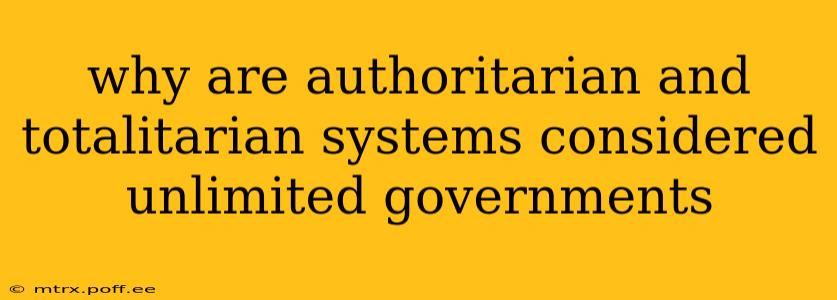Authoritarian and totalitarian regimes are classified as unlimited governments because they lack significant checks and balances on the power of the ruling authority. Unlike democratic systems with their separation of powers and protections for individual rights, these systems concentrate power in the hands of a single person, a small elite group, or a dominant political party, allowing them to operate without effective constraint. This lack of limitation manifests in several key ways:
What are the Key Characteristics of Unlimited Governments?
Unlimited governments are characterized by the absence of meaningful limitations on the power of the ruling authority. This contrasts sharply with limited governments, where power is distributed and constrained by a constitution, independent judiciary, and other checks and balances. The key characteristics of an unlimited government include:
- Centralized Power: All significant power is concentrated in the hands of a single entity, often a dictator or a ruling party. There's minimal power sharing or decentralization.
- Lack of Constitutional Limits: There is no effective constitution or legal framework that restricts the actions of the government. Laws are often arbitrary and subject to change at the whim of those in power.
- Suppression of Opposition: Dissenting voices are silenced through intimidation, censorship, imprisonment, or violence. Freedom of speech, press, and assembly are severely curtailed or nonexistent.
- Control of the Judiciary: The judicial system is often controlled by the ruling power, ensuring that legal challenges to their authority are ineffective. Judges may be appointed based on loyalty rather than merit.
- Limited or No Citizen Participation: Citizens have little to no meaningful say in governance. Elections, if held, are often rigged or sham events, devoid of genuine competition.
How Do Authoritarian and Totalitarian Systems Exhibit Unlimited Government?
Both authoritarian and totalitarian regimes share the core characteristic of unlimited government, although they differ in degree and methods.
Authoritarian Systems: These regimes concentrate power in the hands of a ruler or a small elite group. While they may tolerate some level of social and economic freedom, political freedom is severely restricted. Examples include many monarchies, military dictatorships, and one-party states that don't exert total control over all aspects of life. The limitation on power is largely informal, stemming from traditional norms, the military's power, or the fear of popular unrest, not legal or constitutional constraints.
Totalitarian Systems: These represent the most extreme form of unlimited government. They aim for total control over all aspects of life—political, social, economic, and cultural. They use sophisticated techniques of surveillance, propaganda, and terror to crush opposition and maintain their grip on power. Examples include Nazi Germany and the Soviet Union under Stalin. There is effectively no limit to the power of the state, as it penetrates every facet of society.
Why is the Absence of Checks and Balances Crucial?
The absence of meaningful checks and balances is the defining feature of an unlimited government. In democratic societies, these checks and balances—an independent judiciary, a free press, a legislature that can scrutinize the executive, and a robust civil society—act as safeguards against tyranny. Without them, the government's power is unchecked, leading to potential abuses of power and the suppression of individual rights. This lack of limitation is precisely what makes authoritarian and totalitarian systems inherently unlimited.
What are the Consequences of Unlimited Government?
The consequences of unlimited government are often severe and far-reaching, including:
- Human Rights Abuses: The lack of legal protections leads to widespread violations of human rights, including torture, arbitrary imprisonment, and extrajudicial killings.
- Political Instability: While appearing stable on the surface, these systems can be prone to internal power struggles and violent upheavals.
- Economic Inefficiency: The concentration of economic power in the hands of the state often leads to economic stagnation and widespread poverty.
- Lack of Accountability: There is no mechanism for holding the government accountable for its actions.
In conclusion, authoritarian and totalitarian systems are considered unlimited governments because they lack the essential mechanisms—checks and balances, constitutional limits, and respect for individual rights—that constrain the power of the ruling authority in a limited government. This absence of constraints allows for the potential for arbitrary rule, suppression of dissent, and widespread human rights abuses.
